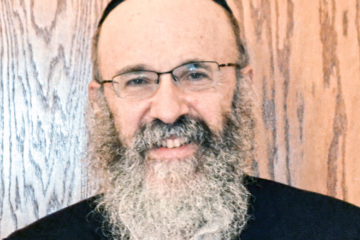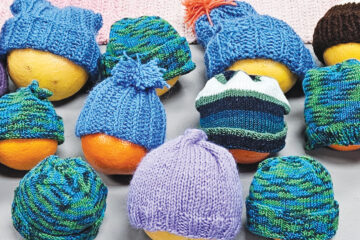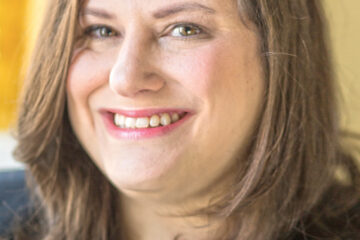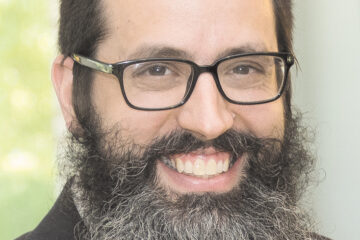Kindling solstice presence into the endless lights
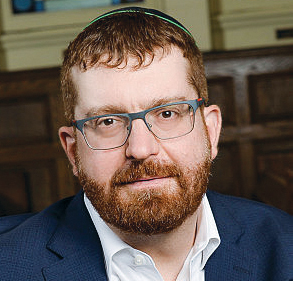
Chanukah in light of Twilight Override
By Rabbi Aubrey L. Glazer, Beth Abraham Synagogue
What are we really kindling during this winter solstice season? I was moved recently by the description of kindling in the 2020 book How God Becomes Real: Kindling the Presence of Invisible Others, where author T.M. Luhrmann describes it as the way people make the divine feel present through repeated, embodied practice. Deep kindling is the process by which we experience the divine as vividly real. This kindling process begins with training attention to notice subtle cues, then cultivating inner senses through imagination and prayer.
With practice, people enter states of absorptive focus where inner experiences feel more tangible. These are reinforced by community and ritual, which validate and normalize them.
Over time, repetition and emotional resonance deepen the sense of presence, until the divine feels immediate and alive — which is then why Luhrmann calls it deep kindling. In this sense, kindling is a process of rehearsal and repetition that turns fleeting impressions into a felt reality of the nearness of divine light amidst the overwhelming darkness of this season amidst the winter solstice. This is the invitation for kindling light on Chanukah which will be explored shortly.
Time for kindling
When do we light and why? There is no shortage of debate amongst the blessed sages about the exact timing of kindling the Chanukah lights — but what does it matter? The differences are minute and yet the ways that Hebrew time is measured, such that the twilight period between sunset and nightfall — a liminal, halachically ambiguous time (ben hashemashot) — stands in contrast to the later point in the evening when people have finished their business in the marketplace and the streets grow quiet (ad sh’tikhla regel min hashuk).
This latter window is oddly enough the preferred time frame for kindling Chanukah candles because it enables a deeper contrast of light against deepening darkness that maximizes publicizing the miracle (pirsumei nisa) — the candles shine most distinctly when the marketplace empties and natural light has faded. This difference is between social visibility and symbolic impact. The deeper the darkness of the latter moment is what makes the menorah’s light not only visible but unforgettable.
Curiously, in rabbinic tradition, this is also the time when one cannot tell whether the sun has set or not. It is a zone of doubt — inimitably captured in the French expression, entre chien et loup, as that time when it is difficult to discern between dog and wolf — where halachic rulings err on the side of caution because the world itself is uncertain. Yet this undecidability is not sterile — it is fertile. Creation itself, according to rabbinic lore, unfolded in such thresholds: the liminal time when the first light was separated from darkness, the precipice, for example, when the Sabbath enters but has not yet arrived.
Arrival of alt-country time
What has however, recently arrived, are songs that hover between irony and sincerity, despair and consolation, in the stellar 2025 alt-country triple album by Jeff Tweedy, Twilight Override. These lyrics carry the same creative suspension, where Twilight Override enacts and carries forward Tweedy’s past idioms — folk, alt-country, experimental rock from Uncle Tupelo to Wilco — yet recombines them into new forms. The triple album is a procession of events, each twilight moment birthing another.
The word override suggests both cancellation and transcendence. Tweedy’s twilight overrides despair not by erasing it but by counterpointing it with creativity. The lyrical landscape is gentle, ironic, consoling, sometimes absurd, but always generative, reminding us that all things created are born in uncertainty — that the dusk is not the end but the fertile ground of new beginnings and will serve as the soundtrack to our reflections on the kindling of light during the winter solstice.
Why alt-country feels Jewish: voice, liturgy, and repair
Have you ever noticed the uncanny and seemingly accidental affinity between alt-country’s tonal world and certain Jewish sensibilities?
Alt-country prizes small domestic scenes, ragged moral honesty, and a voice that mixes sardonic wit with tender yearning; it tells stories of repair, failure, and small mercies. These are precisely the narrative textures that Jewish ritual and exegesis embody: memory, gallows humor, and the insistence that ordinary moments host the sacred.
Wilco’s idiom — spare, conversational, ethically attentive — is channeled by Jeff Tweedy to work like a post-secular wordless melody, what the Chasidic mystics call nigun: a melody whose purpose is to hold affect while language catches up. Tweedy’s insistence on naming and on procedural interruption thus sounds, to many ears, like a liturgical posture. Alt-country can feel Jewish because both traditions are artisanship of voice, training listeners to treat attention as a moral technology. What are the ways of attending to such an invitation into the musical journey of the soul?
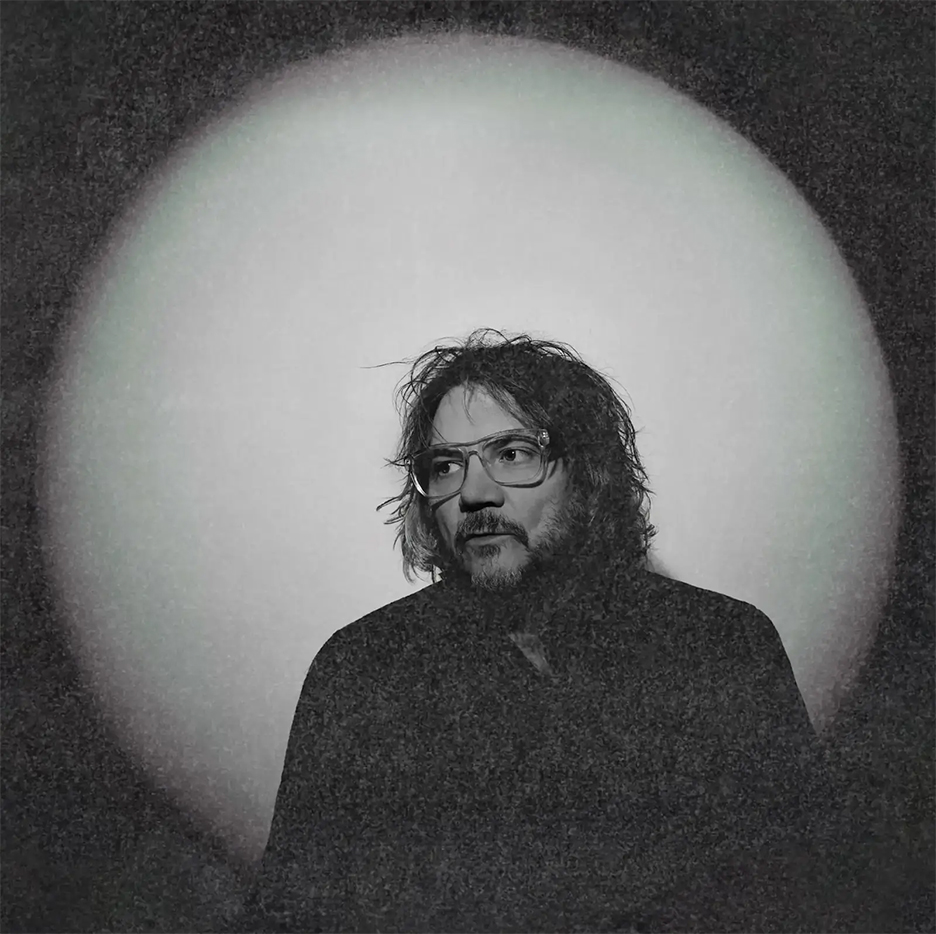
Chanukah as threefold kindling: memory, override, communal habit
Attend to the kindling of Chanukah’s flames and notice — this seemingly simple ritual asks us to become artists of attention itself. Across eight nights we rehearse a small, steady practice — we recall, we interrupt, we repeat — and in the repeating, this ritual is altering the world’s dimness. That impulse is not only the province of pious texts or synagogue ritual, it lives in contemporary music and in the convictions of the public square and the mean streets of life.
Jeff Tweedy and Wilco have gifted us a post-secular liturgy — a set of lines that act like prompts to remember inner light — and those lyrics become especially potent when folded into the ritual actions of Chanukah, a spiritual program that the Ukrainian Chasidic master, Reb Nachman of Bratslav, describes as a way of drawing down da’at, holy awareness, through repetitive ritual — a practice of cultivating majesty through the light of humility.
Memory and the first act of kindling
The first act of Chanukah kindling happens even before we strike the match. We name what we remember: the miraculous rescues, the small acts of courage, the moments when our better selves showed up. Wilco’s lyric from What Light (Sky Blue Sky, 2007) intones how “There’s a light, white light,/inside of you” — swerving from Lou Reed’s last lyrical exit to Brooklyn entitled White Light/White Heat released in November 1967 that defined The Velvet Underground’s avant-garde ethos. Instead, here it works as a musical mnemonic.
Repeated, sung aloud, it trains the heart to notice inner resources even when the world’s machinery threatens to appropriate or dull them. This is the moment of thanksgiving and recognition, in Chanukah terms, as it converts a private spark into a named gift to be shared with others. Memory, rehearsed publicly, resists eclipse. It is the first necessary motion of kindling: We call the light into awareness before we bring flame to wick.
Override as Tweedy’s procedural command and the work of interruption
The second act is the override — a technical, intentional interruption of twilight. Tweedy’s recent lyrical phrasing in Twilight Override (the repeated imperative to override/twilight) reads like spiritual instruction. When the mind slides into fog, when habits numb, when grief begins to anesthetize action, do something small and concrete to break the loop.
Luhrmann’s ethnography of practice makes clear why such micro-interventions matter in showing us that spiritual presences are not accidental apparitions but cultivated realities, brought into felt life by disciplined practices, sensory cues, and imaginative rehearsal.
The lighting of the menorah is itself a ritual override. At dusk, when markets close and the day’s errands are put down, we enact a deliberate interruption. We pause, recite blessings, perform a small technique that reconfigures our attention. By translating Tweedy’s lyrical flourish beyond the merely poetic into the “poethic,” we can adopt the imperative of a micro-ritual to enlighten our inner sanctums and liberate us from the outer darkness enveloping us during this winter solstice.
Repetition, story, Reb Nachman’s da’at
The third act is integration: make the practice stick through repetition and communal narrative. Reb Nachman of Bratslav describes Chanukah as a season in which the “goodly oil” of da’at — integrative spiritual awareness — can be drawn down through the sacral act of lighting. In his view, repeated kindling heals strife, cultivates awe, and invites return (teshuva) by habituating memory and moral perception.
Luhrmann’s insights into deep kindling then confirm that repetition and sensory scaffolding are the technologies that render invisible realities stable in experience. Interwoven, these voices show that the menorah is not merely symbolic, but part of our spiritual formation and renewal. Night after night, a domestic gesture trains the nervous system to recognize presence, to value repair, and to sustain attention long enough for the inner light to be trustworthy rather than fleeting.
Formal kindling practices that make belonging durable
Tweedy’s public embodiment of his journey by choosing Jewish life — a conversionary decision that friends and family have described as shaped by ritual, study, and the felt comfort of communal practice — I would argue, is a vivid example of Luhrmann’s kindling on the scale of a life.
To choose Judaism is not merely doctrinal assent as in other religions; rather here it is the adoption of embodied ancient-new rhythms of a communal calendar, liturgy, convictions, dispositions and rituals that furnish constant cues for attention and living memory into a redemptive future. For a songwriter whose lyrics already gestured toward an inner light, it is then unsurprising he has chosen to join a tradition that incarnates recollection and interruption, so as to give that light a communal architecture: Sabbath’s enforced pausing, the cadence of blessings, the recurring circle of festival time, all of which exemplify scaffolding that prevent the light from being easy prey to fatigue, commerce, or the slow corrosion of habit.
A threefold action directive for Chanukah
Now let us translate this musical journey of the soul and its kindling into an actionable eight-night program that enacts memory and override, and embody it as a single loop:
1. Nightly memory (Act One). Before lighting, each person names aloud a concrete moment from the past year, month, week or day when they perceived an inner brightness — a rescued line of speech, a creative impulse, a merciful act — and offers brief thanks. Let Wilco’s refrains be the chorus you hum as you name the memory.
2. Micro-override (Act Two). Immediately after lighting, perform a small, deliberate interruption: two minutes of simple conversation with your divine source (hitbodedut), eight minutes minus screens, or a quiet walk at dusk. Treat this as a procedural override in the language Tweedy supplies, a trained habit that interrupts twilight.
3. Embody through story and song (Act Three). Conclude with a short tale — a family anecdote, perhaps an interactive retelling of Reb Nachman’s tale, The Chanukah Guest, or another contemporary parable — and then sing together a line that centers you. Repeat this pattern across eight nights so repetition converts private flashes into communal ethos.
Over the eight-day Chanukah pilgrimage, feel the loop as it tightens: memory primes the override, the override lets new habits form, repetition renders the light resilient.
Carrying light between marketplace and menorah
Winter solstice is not the only darkness we must pierce, as Chanukah’s timing — kindling at dusk as markets slow — is symbolically acute. The menorah is also instructing us to carry a steady interior pulse of attention into the marketplace rather than trying to stop the world’s commerce.
In Luhrmann’s terms, ritual produces a new baseline for experience; in Tweedy’s terms, a lyric can command a practical remedy; in Reb Nachman’s terms, repetitive ritual acts at home and in nature can engender moral repair and expand consciousness of goodly oil.
Together, they teach a single ethic: Kindle your attention where life is busiest, override your descent where darkness encroaches, and let communal repetition make your inner light available not only to you but to those you meet when you are walking down the street in your neighborhood, in the marketplace.
Keep kindling beyond closing time
So we have seen that Chanukah is not a moment but a method: memory, override, and embody. Wilco’s lyrics gift seekers of light with the language to remember.
Tweedy’s imperative gifts us the practical verb to act; Luhrmann and Reb Nachman gift us the anthropological and spiritual logic for why these practices work.
Kindle your candles at dusk as the shops close, name a moment of white light within, enact one small override, and tell a short story that repeats the lesson. Kindle and repeat night after night until the habit itself becomes the miracle, a life in which divine light is not a sporadic visitor but a cultivated, communal presence that travels with you into the marketplace and into the long, ordinary nights. May we all keep kindling beyond closing time…
To read the complete December 2025 Dayton Jewish Observer, click here.




